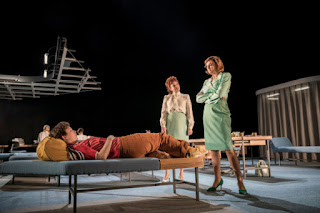Which five people, living or dead, real or fictional, would you invite to your dream dinner party? To most people that’s a creaky old conversation-starter, but to Marlene (Katherine Kingsley) it’s the perfect way to celebrate a promotion, in the famous opening act of Caryl Churchill’s Top Girls. It’s 1981, Marlene’s become the first female Managing Director of Top Girls Employment Agency, and she’s gone to a trendy restaurant with five women from history and legend who embody a female ideal - or at least someone’s idea of it. Victorian adventurer Isabella Bird (Siobhan Redmond) and 13th century Japanese concubine, Buddhist nun and author Lady Nijō (Wendy Kweh) made their own way in a man’s world while others, like Pope Joan (Amanda Lawrence) and Brueghel’s soldier-woman Dull Gret (Ashley McGuire) took on masculine roles, sometimes with tragic consequences.
It’s less clear why Marlene has invited Chaucerian heroine Patient Griselda (Lucy Ellinson,) whose stoicism in the face of years of emotional abuse from her husband infuriates her. But hers is one of the stories that sees a mother’s child taken away from her at birth, and this is what Marlene’s niece Angie (Liv Hill) thinks happened to her: A sixteen-year-old with a much lower mental age, she has a fantasy that her glamorous aunt is her real mother, and runs away from her remote Suffolk home to London, where she believes Marlene will put her up and find her a job.
Churchill’s play gets more naturalistic as it goes on, but the key to that opening fantasy dinner party is that it’s also written as if totally realistic: The women talk over each other, break off into separate conversations and politely ignore each other if they say things they disagree with. Bird is scrupulously polite but keen to one-up everyone’s stories; Joan is pragmatic about a life that fooled people for so long into thinking she was a man, because she never really learned what being a woman was supposed to look like; Nijō is very much a product of a misogynistic society but always found her own way through it; and Gret doesn’t have much to say but does want to make sure she fills up on plenty of potatoes while there’s food on offer. It’s an often funny scene but throughout it the play’s protagonist starts showing her true colours: This may appear to be a collection of female icons but for Marlene every one of them is a means of validating herself and her ruthless route to success.
Written near the start of Margaret Thatcher’s premiership, Top Girls presciently sees that the first female Prime Minister won’t be any kind of boon for feminism, and the only women who’ll see any benefit are those exactly like her, who’ll take on men’s worst qualities to succeed. After a middle act which takes us to the Top Girls agency itself, we return after the interval for a final scene set a year earlier, the last time Marlene visited her sister Joyce (Lucy Black) – and then only after Angie tricked her into it. In a late-night confrontation between the sisters we see how enthusiastically Marlene embraces her survival-of-the-fittest creed.
This isn’t the first time Lyndsey Turner has put a Caryl Churchill play on the Lyttelton stage, but unlike Light Shining in Buckinghamshire Top Girls takes much better to a more epic treatment than it’s had in the past. The opening act is undoubtedly the strongest, while the second, which introduces both Angie and the agency, is the one where the energy drops a bit at times. But the heart of the story comes in the final act – I particularly liked Marlene complaining about her sister reducing their differences to “Us and Them,” and Joyce countering that she only dislikes that argument because it so unambiguously places her as “Them.” As recent controversies have shown the National’s not quite there yet as far as equal representation is concerned, but this well-cast production gives us a stage full of women presenting a play whose message has only gone on to be continually proven in the decades since its premiere.
Top Girls by Caryl Churchill is booking in repertory until the 22nd of June at the National Theatre’s Lyttelton.
Running time: 2 hours 35 minutes including interval.
Photo credit: Johan Persson.




No comments:
Post a Comment